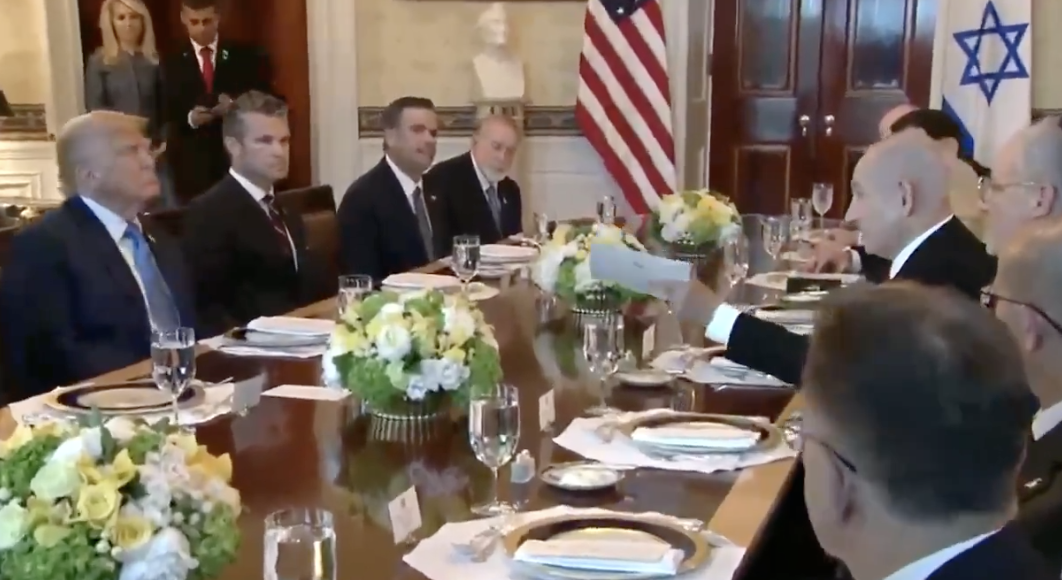“Coming from you in particular, this is very meaningful,” President Trump says when Prime Minister Netanyahu tells him, as they sat down for a White House dinner Monday, that he had nominated him for the Nobel peace prize. Speaking to reporters, the host then often turns to the Prime Minister for answers on issues related to Mideast peace.
One of the reasons Mr. Trump deserves the prize, the prime minister said, was his original plan to allow Gazans to leave the war-ravaged Strip. “It’s called free choice,” Mr. Netanyahu said. Gaza “shouldn’t be a prison.” Israel and America are working to find countries that will “seek to realize what they always say that they wanted, to give the Palestinians a better future,” and “we’re getting close to finding several countries.”
Mr. Trump confirmed that several neighbors of Israel have indicated they would cooperate. “So something good will happen,” he said. The president tossed to his guest another question that has been on America’s and the world’s agenda for a long time: the two-state solution.
An Israeli agreement to the establishment of a Palestinian state might advance peace agreements between Israel and Arab countries like Saudi Arabia. Yet, it is a thorny political issue for the prime minister, whose political allies hate the idea.
“Palestinian should have all the powers to govern themselves, but none of the powers should threaten us,” Mr. Netnayahu said. “Certain powers, like overall security, will always remain in our hands. Now, that is a fact and no one in Israel would agree to anything else, because we don’t commit suicide. We want life, we cherish life for ourselves or our neighbors.”
Yet, Mr. Netnayahu added, “We can work out a peace between us and the entire Middle East with President Trump’s leadership. And by working together I think we can establish a very, very broad peace that will include all our neighbors.”
One of Mr. Trump’s main reasons for inviting the Israeli premier for the third time — more than any other world leader — was the successful Israeli-American cooperation in last month’s strikes on Iran’s nuclear facilities. In recent meetings, Washington has reportedly green-lit future Israeli strikes, if the Islamic Republic attempted to reinstitute its heavily-damaged nuclear program.
Mr. Trump’s special envoy, Steven Witkoff, confirmed, though, that he expects to meet with Tehran counterpart next week. After the June 22 strikes of three Iranian nuclear sites, “I sort of said, what’s the purpose of talking,” Mr. Trump said. “But they’ve requested a meeting, and I’m going to go to a meeting. And if we can put something down on paper, that will be fine.”
The weakening of Iran and its proxies, meanwhile, led to the president’s removal of sanctions from Syria. Can a treaty between Israel and Syria, two enemies that had fought numerous wars since 1948 be far behind? The fall of President Assad “presents opportunities for stability, for security, and eventually for peace,” Mr. Netanyahu said.
The Israeli guest highlighted the Israeli-American cooperation, as well as his personal relations with Mr. Trump, which he said achieved a great military victory in Iran. “I think that there is an opportunity here to create a historic expansion of the Abraham Accords, which were themselves an act of history that deserve a noble prize for the President,” he said.
The prime minister waved off a question about a threat issued by New York’s Democratic mayoral candidate, Zohran Mamdani, who had said that as mayor he would arrest Mr. Netanyahu if he visited the city. Mr. Trump jokingly vowed to get the premier off in such a case.
Mr. Mamdani, the president said, is “not a socialist, he’s a communist. And he said some really bad things about Jewish people, and he said some really bad things about a lot of people. And I think he’s going through a little bit of a honeymoon right now, but he might make it.” If so, Mr. Trump added, the mayor would need White House support, so “he’s going to behave.”
Anyone on earth is entitled to nominate anyone else for the Nobel peace prize. The International Criminal Court’s arrest warrant against Mr. Netanyahu, though, might disqualify his recommendation in the eyes of the Oslo committee.
Mr. Trump could cite successes in making peace between India and Pakistan, between Congo and Rwanda, and progress in widening Mideast peace circles. But the president’s politics might also turn off the Norwegians who award the Nobel. At the same time, Monday’s White House display of American-Israeli solidarity might be its own reward.
(Except for the headline, this story has not been edited by PostX News and is published from a syndicated feed.)

